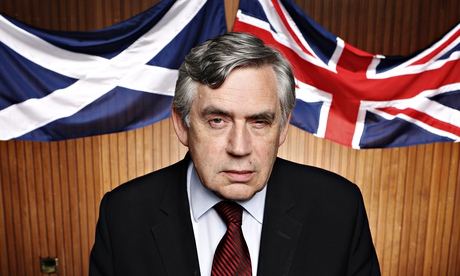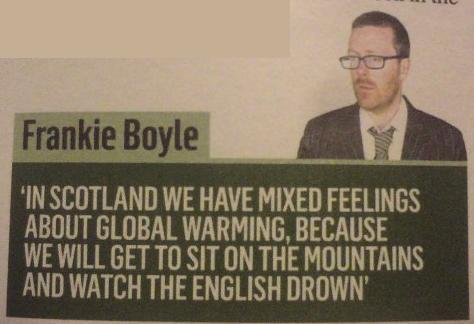
 5 Important Things the Scottish Just Taught Us About Democracy...
5 Important Things the Scottish Just Taught Us About Democracy...
Other | Tuesday 23rd September 2014 | Osh
Braveheart might've been turning in his grave on 18th September when the pro-UK 'Better Together' campaign defeated the Scottish Independence campaign in the country's historic referendum.
It was a close vote, with all the tension of a Champions League Final. 44.7% voted yes for independence, with 55.3% voting for Scotland to remain part of the UK.
But one of the most interesting things to emerge from this epic Battle For Scotland was the rate of voter turnout: an 84.5% turnout. The turnout was in fact the highest for any democratic election or referendum in the UK since 1918. By comparison the most recent UK general election in 2010 had a turnout of only 65%.
So why did the voters of Scotland come out in such numbers? Is it just that the Scottish, as the cliche goes, are incredibly passionate about their national identity? Or is there more to learn from this? The 'voter apathy' theme that journalists frequently comment about just got turned on its head. Here are five things we think may have had something to do with it...
1. The politicians brought their best game.
The key political leaders arguing the case on either side were passionate for once, with a sense of sincerity that's usually absent from our political debates. OK, it wasn't exactly a rap-battle, but they spoke like old-school rabble-rousers concerned with the issues and not like the usual bland, opinionless puppets of corporations and bankers that almost every mainstream UK political figure usually comes across as.
The pro-independence campaigners were predictably passionate about their cause, but some of those arguing on behalf of Things Staying As They Are also brought their best game to the party. Gordon Brown's September 8th speech at the Labor Party's Scottish HQ was something special. When was the last time you saw a mainstream UK politician making such a persuasive, heartfelt speech while also chatting to his audience like a well-meaning old Uncle who's come round for a visit?
This dude was Prime Minister of the UK and in all that time he never made a speech like that, never spoke with that level of character, personality or emotion. In fact the media constantly mocked him for his lack of personality and speechmaking abilities. But suddenly when he's not PM anymore and he's up in his home country talking about the future of Scotland, he's like a whole different creature.
If the level of our standard political debates, including election debates, were waged on the sort of level we saw in the Scottish Referendum, particularly from someone as hardcore as Gordon Brown (just look at his awesome 'death ray' eyes in the picture below), it would be a game-changer as far as voter turnout is concerned. Lots more people would be much more engaged.

2. It was a clear-cut yes or no issue and it was in the hands of the people.
The independence vote presented people with a straight yes or no vote on a clear issue and it had a sense of urgency: we're voting now, it's getting decided today and that's that. Those are the kind of stakes that make people act in the moment.
In most elections on the other hand, a lot of the electorate doesn't have a clear-cut sense of what it will ultimately mean for them to vote one way or the other. This is partly because our parties and politics are so convoluted that many people don't have the time to try to understand it all and make an informed vote.
That's where the politicians owe it to us to present their ideals and politics to us in a way that empowers a bigger percentage of average voters to more fully understand what they're voting for and why they should vote one way or the other. Because that's what the '84%'(in Scotland's case) is made up of: standard, working people who don't have time to study all the agendas, sub-agendas and fine print like it's a uni course.
The way most parties' policies and ideas are typically represented is either in that patronising, dumbed-down way that says nothing to no one, like they often do in the US ("Don't Vote Obama, Folks - He's a Secret Muslim, etc") or targeted at the highly educated or political classes while alienating huge sections of the broader population.

In Scotland in September the people knew what they were voting for and why. More importantly they knew the vote mattered and they knew the power was genuinely in their hands to decide the outcome.
3. It mattered.
What this Scottish Independence Referendum demonstrated was what democracy SHOULD look like when it's working properly; as in massive voter participation, passionate debate, political leaders arguing full-on and not like half-arsed salespeople, and most importantly people inspired to care in a meaningful way about the outcome.
With other modern elections in the UK, the talk has been more and more about the low voter turnout, the rising apathy and the feeling, particularly among the young, that their vote doesn't count for much. This is the theme hit on recently by Russell Brand among others, especially in his famous clash with Jeremy Paxman on Newsnight earlier this year. In that interview, Brand, in his own eccentric way, called it "indifference" and not apathy.
That feeling that voting in elections might be a pointless exercise was reinforced in our last UK General Election when we ended up with a mixed-party government that no one technically voted for. Voters in the US might've felt equally disaffected when George Bush and the Republicans were declared victors in the US Presidential Election of 2001 despite the fact that allegations were made on that very day that there had been vote-count 'irregularities' and that Bush might not have been the legitimate winner.
All of this adds to a growing sense many have that our systems of government are basically self-perpetuating, self-protecting entities that are simply carrying out pre-determined agendas from year to year or decade to decade regardless of which party is briefly in power at any time. The major parties' ideals also seem so changeful at times that most people have no idea if the policies or ideals they're voting for will stay on the agenda once their party gets into power.
But the voters in Scotland in September didn't feel that way. For once there was something clear and present to vote for and it counted. The only way that same level of engagement can be repeated for general elections and other democratic processes in the UK is if the outcome is seen to ultimately matter and the people are made to feel important and empowered in the process.
4. The debate was so fired up because it touched on the pulse of the nation.
Are the Scottish more passionate about their country than British citizens are about the UK in general? It's a common cliche that the Scottish, Irish and Welsh are passionate about their own independent cultures and national identities in a way that the English aren't necessarily known to be.
A reason for this could be the major historical issues. An argument could be made that nations and societies that have a grudge to bear for past injustices identify much more with their national identity than in cultures where the society has traditionally been powerful or in control.

Much of the cultural mentality in Scotland and Ireland, for example, is connected with old grudges against the English and the old British Imperialist era. When you have a debate and a vote that touches on those issues of identity and history, you're going to get a high level of reaction and engagement. That doesn't happen in most public voting situations where sensitive issues and historical gripes are avoided for fear of treading on anyone's toes or just plain pissing off potential supporters.
Now we're not necessarily saying that sensitive or toxic issues should be poked at in all elections and voting situations; things might get ugly if that happened. But if political campaigners are looking to raise the levels of voter turnout, then not being afraid to touch a nerve would generate much more interest and passion.
5. The politicians were afraid. It may be that the guardians of the political system ultimately wouldn't want to see the level of interest in the Scottish independence debates carry over into our more standard elections and votes. For one thing, making more people more passionate and more politically aware would mean that the people could start to dictate the course of politics en masse.
They'd be afraid of any population that could do that. That's what happened in Scotland: it was fear that drew all the main political leaders up to Scotland at the last minute. They were panicking, staging an intervention, because they realised the Scottish people were properly engaged in this debate and might bring about a massive change against 'the common interest'.
That's what can happen when the people get properly drawn in to a debate; they can potentially direct the course of history. That's how democracy is meant to work, even if most of the time it doesn't seem to.
